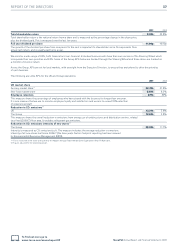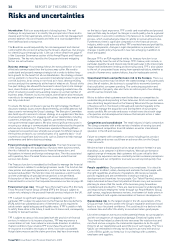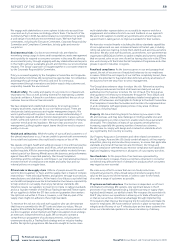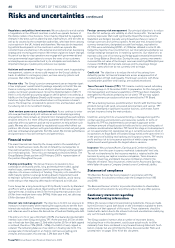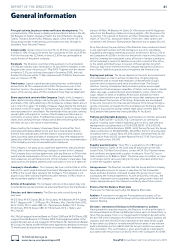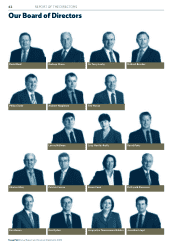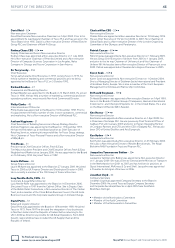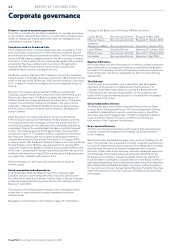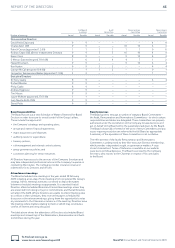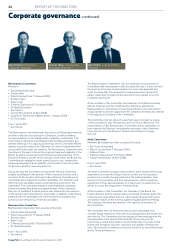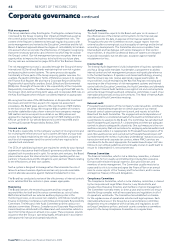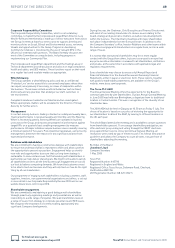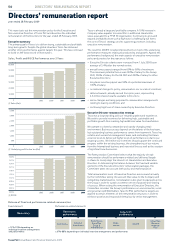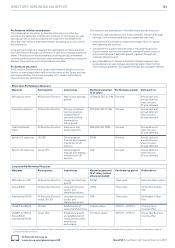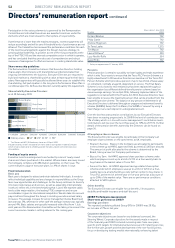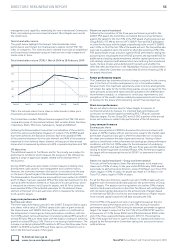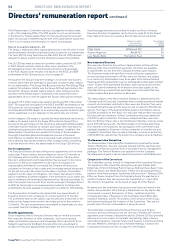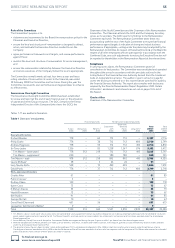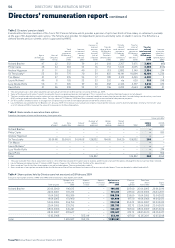Tesco 2009 Annual Report Download - page 49
Download and view the complete annual report
Please find page 49 of the 2009 Tesco annual report below. You can navigate through the pages in the report by either clicking on the pages listed below, or by using the keyword search tool below to find specific information within the annual report.
47
REPORT OF THE DIRECTORS
Tesco PLC Annual Report and Financial Statements 2009
To find out more go to
www.tesco.com/annualreport09
The need for training is kept under review and the annual agenda ensures
time is dedicated to technical updates which are generally provided by
external experts. This year training was provided on accounting and
reporting developments under IFRS, IFRIC, IAS, and other relevant guidance
and standards. Training is also provided to meet specific individual needs of
Committee members.
Management of the Group – Executive Committee
The Board delegates responsibility for formulating and implementing
the Group’s strategic plan and for management of the Group to the
Executive Committee, which comprises the eight Executive Directors and
is chaired by the Chief Executive. The Committee, which is not a statutory
committee, has authority for decision-making in all areas except those
set out in the Schedule of Matters Reserved for Board Decision and
meets formally every week. A number of senior executives also attend
the Committee and their valuable operational experience helps broaden
the debate. Their attendance facilitates the communication of the
Committee’s decisions to the rest of the Group. The Company Secretary
attends in his capacity as Secretary of the Committee.
The Executive Committee is responsible for implementing Group strategy
and policy and for monitoring the performance and compliance of the
business, drawing on the work of relevant committees, and reporting on
these matters in full to the Board.
The Executive Committee has set up further non-statutory committees –
including the Finance, Compliance and Corporate Responsibility Committees
(which are described in more detail below) – and operational groups which
have responsibility for implementing the key elements of the Group’s
strategic plan and managing its UK and international operations, joint
ventures, property acquisitions, finance, funding and people matters.
These committees and groups have as members an appropriate mixture
of Executive Directors and senior management from relevant functions.
Procedures to deal with Director’s conflicts of interest
The Company has procedures in place to deal with the situation where
a Director has a conflict of interest. The procedures have been revised
in accordance with the new provisions set out in Companies Act 2006.
As part of these procedures members of the Board are required to:
consider each conflict situation separately on its particular facts;
consider the conflict situation in conjunction with the rest of their
duties under Companies Act 2006;
keep records and board minutes as to authorisation granted by Directors
and the scope of any approvals given; and
regularly review conflict authorisation.
Training and development
All new Directors receive a personalised induction programme, tailored
to their experience, background and particular areas of focus, which is
designed to develop their knowledge and understanding of the Group’s
culture and operations. The programme has evolved taking into account
feedback from new Directors, and will usually include an overview of the
business model and Board processes, meetings with the Executive team
and senior managers, site visits across our international operations and
briefings on key issues (including social, ethical and environmental (SEE)
issues). Directors also receive an induction to those Board Committees
he or she will serve on.
The need for Director training is regularly assessed by the Board and
regular training sessions are arranged to provide an opportunity for
upskilling of the Directors on a variety of areas relevant to the Group’s
business, including SEE issues. In the coming year the Board proposes
to hold training sessions focusing, inter alia, on the regulation and
governance issues associated with operating a financial services business,
following the acquisition of Tesco Personal Finance.
The Board usually holds at least one meeting overseas each year to
facilitate the Directors’ understanding of the Group’s international
operations. In March 2008, the Board convened in the USA to enhance
their understanding of the progress of the Fresh & Easy operation.
Board performance evaluation
The performance of the Board is a fundamental component of the Group’s
success. The Board regularly reviews its own performance. During the year
ended 28 February 2009, the Board assessed its own performance. This
assessment was co-ordinated and directed by the Chairman with the
support of the Company Secretary. A questionnaire covering the main
areas of evaluation was prepared by the Chairman and the Company
Secretary and formed the basis of in-depth interviews with each Director.
The results of the evaluation were considered by the Board, and confirmed
the strength of the strategic and entrepreneurial leadership of the
Company, a sound governance framework and practices compliant with
the Combined Code.
The Chief Executive reviews the performance of each Executive Director.
The Chairman reviews the performance of the Chief Executive and each
Non-executive Director. During the year, the Chairman met with the
Non-executive Directors, without the Executive Directors present, to
discuss Board issues and how to build the best possible team. The Senior
Independent Non-executive Director met with the Non-executive Directors
in the absence of the Chairman, to assess the Chairman’s performance.
Risk management and internal controls
Accountabilities
Accepting that risk is an inherent part of doing business, our risk
management systems are designed both to encourage entrepreneurial
spirit and also provide assurance that risk is fully understood and managed.
The Board has overall responsibility for risk management and internal
control within the context of achieving the Group’s objectives. Executive
management is responsible for implementing and maintaining the
necessary control systems. The role of Internal Audit is to monitor the
overall internal control systems and report on their effectiveness to
Executive management, as well as to the Audit Committee, in order to
facilitate its review of the systems.
Background
The Group has a five-year rolling business plan to support the delivery
of its strategy of long-term growth and returns for shareholders. Every
business unit and support function derives its objectives from the
five-year plan and these are cascaded to managers and staff by way
of personal objectives.
Key to delivering effective risk management is ensuring our people
have a good understanding of the Group’s strategy and our policies,
procedures, values and expected performance. We have a structured
internal communications programme that provides employees with
a clear definition of the Group’s purpose and goals, accountabilities
and the scope of permitted activities for each business unit, as well as
individual line managers and other employees. This ensures that all our
people understand what is expected of them and that decision-making
takes place at the appropriate level. We recognise that our people may
face ethical dilemmas in the normal course of business so we provide clear
guidance based on the Tesco Values. The Values set out the standards
that we wish to uphold in how we treat people. These are supported by
the Group Code of Ethics which offers guidance on relationships between
the Group and its employees, suppliers and contractors. The Company
is a signatory to the DTI Code of Conduct and met its obligations for
implementing the Code for the financial year ended 28 February 2009.
We operate a balanced scorecard approach that is known within the
Group as our Steering Wheel. This unites the Group’s resources around
our customers, people, operations, community and finance. The scorecard
operates at every level within the Group, from ground level business units,
through to country level operations. It enables the business to be operated
and monitored on a balanced basis with due regard for all stakeholders.


